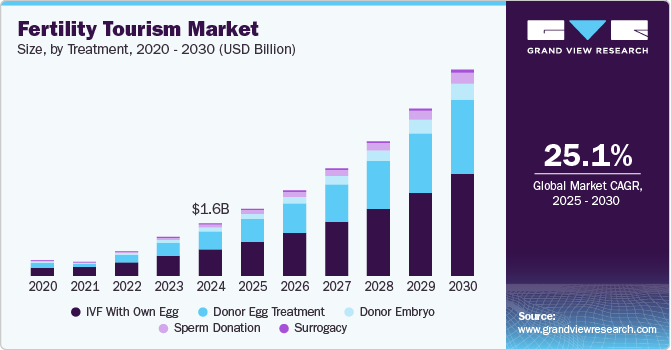Fertility tourism, the practice of traveling abroad to seek fertility treatments, has emerged as a global phenomenon driven by various economic, legal, and social factors. From affordable treatments to access to cutting-edge medical technologies, fertility tourism presents numerous opportunities for patients and healthcare providers alike. This blog explores the rising trend of fertility tourism, its underlying causes, and the vast opportunities it offers to the global healthcare industry.

The Growth of Fertility Tourism
The fertility tourism market has grown significantly over the past decade, becoming a multi-billion-dollar industry. According to market research, the global fertility tourism market is projected to grow at a compound annual growth rate (CAGR) of 25.11% between 2025 and 2030. Several factors have fueled this rapid expansion:
- Increasing Infertility Rates: Infertility affects approximately 15% of couples globally, with many unable to conceive due to medical conditions, lifestyle factors, or age. The rise in infertility rates has heightened demand for advanced reproductive treatments, prompting many to seek affordable and accessible solutions abroad.
- Cost Savings: Fertility treatments, particularly in vitro fertilization (IVF), are notoriously expensive in countries like the United States and the United Kingdom. Patients can save up to 80% by undergoing treatments in countries like India, Mexico, or the Czech Republic.
- Legal and Ethical Considerations: Legal restrictions on fertility treatments in certain countries have driven patients to seek services elsewhere. For instance, countries with bans on egg donation, surrogacy, or LGBTQ+ fertility treatments see residents traveling abroad to fulfill their reproductive goals.
- Advancements in Medical Technology: Improved medical facilities and innovative technologies in emerging markets have made international fertility clinics competitive with those in more developed countries.

Popular Destinations for Fertility Tourism
Countries around the world have positioned themselves as hubs for fertility tourism, leveraging advanced medical practices and competitive pricing to attract international patients.
- Spain: Spain is a leading destination for fertility tourism due to its liberal laws, high-quality medical facilities, and anonymous egg donation policies. It performs nearly half of all IVF treatments involving donor eggs in Europe.
- India: Known for cost-effective treatments and cutting-edge technologies, India has become a major destination for couples seeking affordable solutions for infertility.
- Czech Republic: The Czech Republic attracts patients with its modern facilities, favorable legal frameworks, and affordable IVF treatments. The country’s clinics often report success rates comparable to those in Western Europe.
- Mexico: Mexico’s proximity to North America and its liberal assisted reproductive technology (ART) laws make it an increasingly popular choice for U.S. and Canadian patients.
- Turkey: With state-of-the-art clinics and experienced professionals, Turkey has become a competitive player in the fertility tourism market.
Opportunities in Fertility Tourism
The rise of fertility tourism creates a wealth of opportunities across various sectors:
1- Economic Growth for Host Countries
Countries that position themselves as fertility tourism hubs benefit from increased foreign exchange revenue. The influx of international patients boosts local economies by supporting healthcare, hospitality, and tourism industries.
2- Expanding Medical Innovation
The competition to attract international patients encourages healthcare providers to adopt advanced technologies and improve treatment methodologies. This innovation benefits both local and global patients.
3- Cross-Border Collaboration
Fertility tourism fosters partnerships between clinics, governments, and research institutions, paving the way for collaborative advancements in reproductive medicine.
4- Accessibility and Inclusivity
Countries offering fertility treatments to underserved populations, such as LGBTQ+ individuals and older women, position themselves as leaders in inclusive healthcare. By addressing gaps left by restrictive laws elsewhere, these nations cater to a broader patient base.
5- Opportunities for Healthcare Providers
Fertility clinics can tap into the lucrative market of international patients by offering competitive pricing, customized packages, and multilingual staff to accommodate diverse clientele.
Challenges to Consider
Despite its numerous opportunities, fertility tourism also faces challenges:
- Regulatory Discrepancies: Varying laws across countries can complicate cross-border fertility arrangements, such as surrogacy contracts or embryo transport.
- Ethical Concerns: The commercialization of reproductive healthcare raises ethical issues, including exploitation of donors or surrogates.
- Post-Treatment Care: Ensuring continuity of care for patients returning to their home countries remains a critical issue.
Fertility Tourism in Turkey
Turkey has rapidly emerged as a preferred destination for fertility tourism, thanks to its blend of high-quality medical care, affordability, and cultural appeal. Here’s a detailed look at why Turkey is becoming a hub for international patients seeking fertility treatments:

1. Advanced Medical Facilities
Turkey is home to modern fertility clinics equipped with state-of-the-art technology and staffed by highly trained medical professionals. Many clinics in Turkey offer comprehensive services, including IVF, egg freezing, and genetic testing, with success rates comparable to those in Western countries.
2. Affordability
The cost of fertility treatments in Turkey is significantly lower than in many other countries. For instance, the average cost of an IVF cycle in Turkey ranges between $2,500 and $4,000, compared to $15,000 in the United States. This affordability makes Turkey an attractive option for patients who would otherwise struggle to afford treatment.
3. Expertise and Success Rates
Turkish fertility clinics are known for their high success rates, particularly for IVF procedures. Clinics often employ internationally trained specialists who use the latest techniques and adhere to global best practices. This combination of expertise and advanced care ensures positive outcomes for many patients.
4. Legal Framework
Turkey’s legal framework allows many forms of assisted reproductive technology (ART), including IVF and egg donation. However, the country maintains some restrictions, such as prohibiting surrogacy and treatments for unmarried couples, which align with its cultural and legal norms.
5. Accessibility and Location
Turkey’s strategic location at the crossroads of Europe and Asia makes it easily accessible to patients from various regions, including the Middle East, Europe, and Central Asia. Major cities like Istanbul and Ankara are well-connected by international flights, and many clinics offer concierge services to assist with travel and accommodation.
6. Medical Tourism Infrastructure
Turkey has invested heavily in its medical tourism infrastructure, offering seamless experiences for international patients. Many fertility clinics provide multilingual staff, personalized care plans, and package deals that include treatment, accommodation, and transportation.
7. Cultural Appeal
In addition to world-class medical care, Turkey’s rich history and cultural attractions make it a desirable destination for medical tourism. Patients and their families can explore iconic landmarks, enjoy Turkish cuisine, and experience the country’s hospitality during their stay.
8. Support for International Patients
Fertility clinics in Turkey often cater specifically to international patients by providing detailed consultations and follow-up care. Many clinics have partnerships with global organizations, ensuring continuity of care even after patients return to their home countries.
Future Prospects
As fertility tourism continues to grow, the industry is expected to see greater innovation and collaboration. With advancements in artificial intelligence, genetic screening, and personalized medicine, the future of fertility tourism holds immense promise. Countries investing in infrastructure, technology, and patient-centered care are poised to become global leaders in this burgeoning field.
Conclusion
The rise of fertility tourism reflects a global shift towards more accessible, affordable, and innovative reproductive healthcare. For patients, it offers hope and opportunity; for host countries and healthcare providers, it presents a chance to drive economic growth and medical advancements. By addressing its challenges and leveraging its opportunities, fertility tourism can continue to thrive as a vital component of global healthcare.







